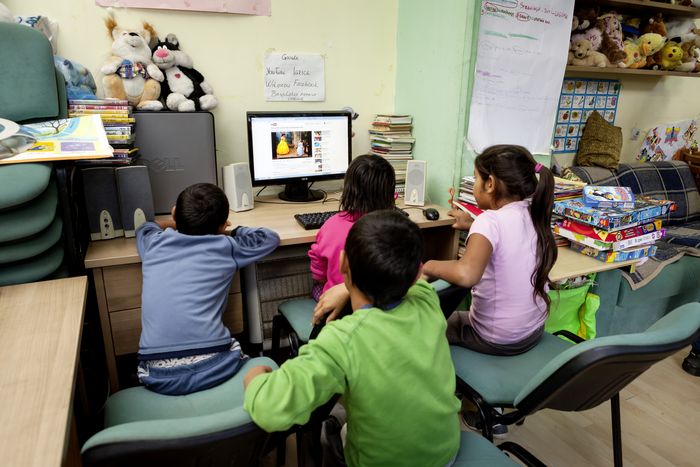While travelling sex offenders used to find their victims once they had reached their destination, the Internet nowadays opens up new avenues. ‘Cyber-grooming‘ on social media enables offenders to purposefully develop contacts with children and adolescents. They surreptitiously win the trust of young people in order to initiate sexual abuse online or when they eventually manage to meet them. They travel to meet their victims within their own countries or abroad in order to rape or exploit them, assuming that far from home the risk to be caught is rather low.
In interviews for a study conducted by ECPAT Germany in 2016, imprisoned German sexual offenders in Cambodia stated that in the choice of their long-haul destination fast internet access in the locality had played a decisive role. Nowadays, sex offenders ably make use of all the possibilities available through new technologies and social media – both online and offline.
Social media help to get in contact
Via Internet it has become comparatively easy to get in touch with children either directly or through a third person. Sexual offenders often use fake identities and roam around in chatrooms and games that specifically target children and adolescents. They use social networks to build long-term relationships in order to manipulate young people online and enforce sexual abuse, e.g. via live stream. The offenders often use photos and videos showing the abuse to extort more sexual activities from the children over long periods of time.
The Internet does not forget
Sex offenders generally do not settle for sexual violence alone, but also document their offences. Photos and videos showing sexual abuse of children are collected, exchanged, sold for a lot of money, or uploaded online. With the renewed and continued sexual abuse via digital media, the victimised children and adolescents are brought into subjection. The longer they have to sustain this sexual violence, the harder it gets for them to escape their tormentors. Even years after the offences, victims are confronted with these situations time and again, which makes therapeutic treatment more difficult.
Sexual violence both online and offline
Sexual offenders are usually successful in finding out where their victims live. From this point, there are no more obstacles preventing them from meeting their victims. In many cases, meetings are also arranged by third persons trusted by the victims. For quite some time now, travel with the purpose of sexually offending children has not been limited to certain ‘infamous’ long-haul destinations. Sexual offenders make use of their anonymity on the internet and away from home. They use a variety of touristic infrastructure, take no-frills or scheduled flights, train or coach, car or caravan. To commit their offences they choose hotels, holiday apartments and increasingly also Airbnb accommodations. In as early as the 1990s it became known in the Philippines that ‘sugar daddys‘ like to stay with families who have children. Nowadays, web portals facilitate the booking of private accommodation.
Prosecution in Germany and abroad
In Germany, sexual abuse and child sexual abuse materials largely constitute indictable offences. A major trial against several sexual offenders ended in Freiburg in spring 2019, sentencing the offenders to long imprisonment. On the Internet and in the Darknet they had arranged meetings with a mother and her partner to rape the couple’s son. Some of the offenders had travelled to Southern Germany from other countries. According to the police, holiday homes were used to commit the offences.
According to Vietnamese newspaper reports in January 2016, a 45 year old man was sentenced in Vietnam to five years‘ imprisonment for sexualised violence against two boys. The offender had entered the country as a tourist and then lived as an expat in Vietnam, working at a school. With the help of a translation app he managed to communicate with the boys and to sexually abuse them several times in an apartment.
Need for prevention
In order to effectively protect children and adolescents, there is a need for education and awareness raising. The countries with up-to-date media-related laws to protect children and adolescents are still too few. Laws are needed which hold companies responsible and take into account that in many parts of the world children and youth use mobile devices with internet access and communicate via social media.
So far, at least in specific cases it has been possible to convince large companies, such as Facebook and Google, to introduce protection measures and to cooperate. The tourism sector also needs to do more in terms of prevention of sexual violence through digital media and via Internet. This particularly applies to hotels and hotel associations, holiday home portals, agents selling private accommodation, managers of camping sites and their interest groups – very few of whom have introduced measures to protect minors against sexual violence, even though there are exemplary concepts implemented by some hotels and international hotel chains which would be easy to adapt.
Tourists can also contribute to the protection of children and adolescents by reporting suspicious situations in Germany and abroad on the web portal “Don’t look away“. When booking their holidays, they can give preference to companies and booking portals that take child protection seriously.
Josephine Hamann has since mid-2018 been working with the child protection organisation ECPAT as a project coordinator and is in charge of accompanying tourism businesses in implementing child protection measures. Mechtild Maurer has been the managing director of ECPAT Germany for many years.
Translation from German into English by Christina Kamp.



